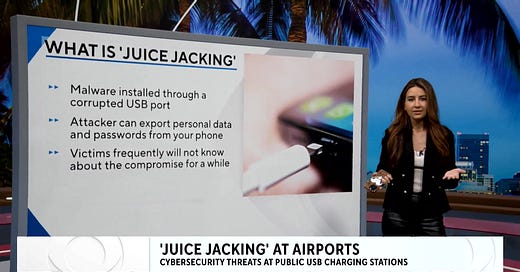It’s called juice jacking.
You arrive to your gate at the airport and realize your phone battery is dying and you need to charge it. We’ve all done it - plug our phones into a public charging port.
But the TSA has issued a stern warning to travelers ahead of the summer rush: hackers can install malware in USB ports and steal all your personal data. Think of it as a digital pit pocket using a USB cable.
You may think you’re getting “juiced up” before your flight, but hackers have been setting up fake charging ports so when you plug in your phone they suddenly gain access to your passwords, credit cards, contact list and any personal information on your phone.
“There are these USB charging stations so they just go around and they insert malware into that,” Cybercatch CEO, Sai Huda, told me in an interview. “The malware gets into people's devices and now the criminals are able to get access. A lot of people go through the airport. Naturally, a lot of people are unsuspecting, busy, multitasking.”
1.7 billion consumers were affected by cyberattacks last year and that trend continues. The FBI tells me this kind of scam is difficult to catch and victims typically don’t even realize their phone has been compromised.
Juice jacking is only done through a USB port, so you’re still safe to plug your phone it into plugs. If you absolutely need to plug into a USB make sure you’re using a charging cable and not a data transfer cable.
So what should you do? I spoke to officials from the FBI, TSA and cybersecurity experts, here are their biggest tips.
Avoid charging through USB ports
Always charge into a wall electrical outlet
If you absolutely have to use a USB port to charge, use a USB data blocker
Never join an unknown free public WiFi
Bottom line - don’t go plugging in your phone anywhere. USB’s have historically been a data sharing interface. You really shouldn’t be using it to charge your device.
“I think there's a responsibility on the part of airports and public facilities to make sure those USB charging ports are legitimate,” Huda said. “They should be tested so that unsuspecting consumers don't fall prey. So I think it's a collective effort, but certainly consumers should practice good cyber hygiene and be careful.”
Y










Share this post